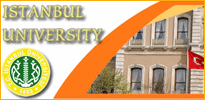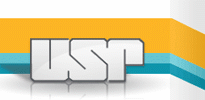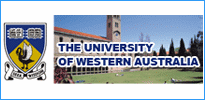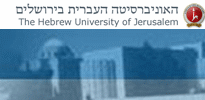Botswana: Botswana Education Profile
2015/09/03
Education System in Botswana
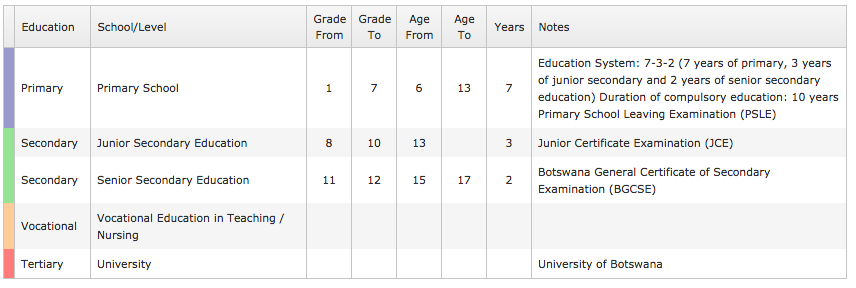
History
In the colonial period, responsibility for developing education was left up to the Batswana merafe and missionaries. Achievements were made at the primary level, but parents remained dependent on secondary schools in South Africa and Rhodesia (Zimbabwe). At independence, Botswana had only one government secondary school and was a decade away from building its own university (although there were at least seven nongovernment secondary schools).
Since independence, universal primary education has been the goal of each National Development Plan, and since 1985 the share of children aged six to 12 attending schools has risen steadily, reaching 87 % in 2004. Since 1987, the government has guaranteed access to 10 years of schooling. In 2006, nominal school fees were introduced at the secondary level for the initial time, but they have been unpopular and unenforceable.
Tertiary education in Botswana began in 1964 with the establishment of the University of Basutoland, Bechuanaland, and Swaziland, which was subsequently renamed University of Botswana, Lesotho, and Swaziland (UBLS) with its campus in Roma, Lesotho. Following the breakup of UBLS in 1975, Botswana and Swaziland established the University of Botswana and Swaziland (UBS) and built university colleges in Gaborone and Kwaluseni. In 1983, UBS was dissolved, and the University of Botswana was established (as was the University of Swaziland). The University of Botswana offers certificates, diplomas, and undergraduate and graduate degrees.
Admission into all governmental senior secondary and tertiary institutions is through competitive examination and earns national students a full bursary (though, in recent years, a bursary has not been guaranteed). The % of students passing through each level of the government school system continues to rise. In 1991, only 25 % of Botswana’s students were admitted into senior secondary schools, while the number of university students represented 4.3 % of the total number of students in senior secondary schools. By 2005, progression rates from junior secondary schools to senior secondary schools had risen to 63 %.
Current
Education in Botswana is not compulsory. The educational structure mirrors the United Kingdom system in that there is universal access to primary and junior secondary school, while a process of academic selectivity reduces entrance to the senior secondary school and university education.
Primary education in Botswana begins at age six and lasts for seven years (with each level called a “Standard”), leading to the Primary School Leaving Certificate (PSLE). Secondary education lasts for five years (with each level called a “Form”), and is divided into two cycles. The initial is a three-year cycle leading to the Junior Certificate Examination (JCE). Completing the JCE may lead to admission to the senior secondary school program. Only those students whose grades are high enough on the JCE are admitted to the second cycle, the senior secondary program. The senior secondary program is a two-year cycle preparing students for the Botswana General Certificate of Secondary Education (CSE), which determines a student’s aptitude for higher education. Botswana is in the process of building unified secondary schools, Form I to Form V, in the remote areas of the country to increase access to a senior secondary education.
One central objective of primary education is for children to be literate initial in Setswana and again in English. Other goals are for children to become knowledgeable in mathematics and to have a command of science and social studies. From 1991 to 1997, the number of students completing the primary level and entering junior secondary increased from 65.0 % to 98.5 %. It has remained around this level through to 2010.
Education has been given priority in the national budget. The Ministry of Education averages 10 % of the national budget. The Department of Secondary Education and Teacher Training and Development shares approximately 64 %, and the ministry headquarters, which is responsible for University of Botswana part other projects, receives approximately 25 %. The 11 % balance is usually spent on improving facilities and functions under the technical education, non-formal education, curriculum development
With the discovery of diamonds just next independance and the increase in government revenue that this brought, there was a huge increase in educational provision in the country. All students were guaranteed ten years of basic education, leading to a Junior Certificate qualification. Approximately half of the school people attends a further two years of secondary schooling leading to the award of the Botswana General Certificate of Education (BGCSE). Next leaving school, students can attend one of the six technical colleges in the country, or take vocational training courses in teaching or nursing. The best students enter the University of Botswana in Gaborone, a modern, well-resourced campus with a student people of over ten thousand.
The quantitative gains have not always been matched by qualitative ones. Primary schools in particular still lack resources, and the teachers are less well paid than their secondary school colleagues. The Government of Botswana hopes that by investing a large part of national gain in education, the country will become less dependent on diamonds for its economic survival, and less dependent on expatriates for its skilled workers.
(the ministry writes most of the textbooks), and evaluation and appropriate education departments. The Ministry of Education expanded from a small unit of government at independence to one that looks next the educational needs of hundreds of thousands students from primary to tertiary levels.
Recently the ministry undertook to reevaluate its priorities and strategy in the context of Botswana's changing and complex economy; to advise on ways to ensure the education system is sensitive and responsive to the people's wishes and the country's manpower requirements; to study the various methods of streaming into vocational and academic groups at the senior secondary level; to study how the senior secondary structure relates to the University of Botswana degree programs and to determine how the two programs may best be reconciled; and to advise on the organization and diversification of the secondary school curricula to prepare students who do not continue with higher education.
Enrollment
At the beginning of 2009, there were 330,775 students enrolled in primary schools, with female enrollment accounting for 48.8 %. There has been an increase of half a % on the previous year’s enrollment. Enrollment in private schools was 5.8 % (19,239) of the total primary school enrollment. In the same year, there were 171,986 students in all secondary schools in the country. Sixty % of those students were female students.
Teacher quality
The majority of teachers in primary schools are females, accounting for 75.6 %. About 98.4 % of all teachers are trained and employed on a permanent basis. There were 6,652 teachers with diplomas in education for 2009. The student to teacher ratio for 2009 was 26:1.
Curriculum
Basic education consists of several components designed to prepare students for the varying life paths that they may face upon graduation. Foundation skills are meant to give students skills applicable to work situations, such as decision-making and problem-solving, communication, team work, and computing. Most academic subjects are taught with a vocation orientation. Teachers are asked to demonstrate to students the practical application of concepts. These measures are meant to graduate classes that are “ready for the world of work.” Curricular and co-curricular activities are developed to provide students with an awareness and considerate and appreciation of the values of all types of work. This includes knowledge about the economy, the process and organization of production, and the demands of the working life.
Lower primary education consists of: Setswana, Mathematics, Environmental Sciences, English, Creative and Performance Arts, and Cultural Studies. Upper primary education consists of: Agriculture, Religious and Moral Education, Setswana, Social Studies, English, and Science. Secondary education consists of a Serswana, Mathematics, English and a host of elective subjects that students take classes in to create a concentration.
Primary Education
Education in Botswana is free for the first 10 years, which completes the cycle through middle school. The first 7 years of this are at primary school, where the pupil-teacher ratio is approximately 13 to 1.The medium of education is Setswana for the 1st 4 years, thereafter English.
Middle Education
Progression to middle school is no longer contingent on a pupil passing their primary school leaving examination. At the end of their form 3 year though, students must sit for their compulsory junior secondary examination. If they pass then they may study further. In either event they may also go to work, because their compulsory education program is complete.
Secondary Education
Secondary school, where the pupil teacher ratio has dropped to 24 to 1 takes 2 more years. It culminates in the senior secondary examination, which is a pre-requisite for tertiary education of any kind.
Vocational Education
The Botswana Training Authority regulates the standard of vocational training across the entire spectrum, in order to promote the development of an integrated system that's accessible to all.
Tertiary Education
There are a variety of tertiary education institutions in Botswana, including colleges of accounting and agriculture, and institutes of administration, commerce, and health sciences.
Chief among these is the University of Botswana opened in 1964. It has over 17,000 students spread across its faculties of business, education, engineering & technology, humanities, science, and social sciences. Programs include certificates, and bachelors, masters and doctoral degrees.
Botswana Credentials
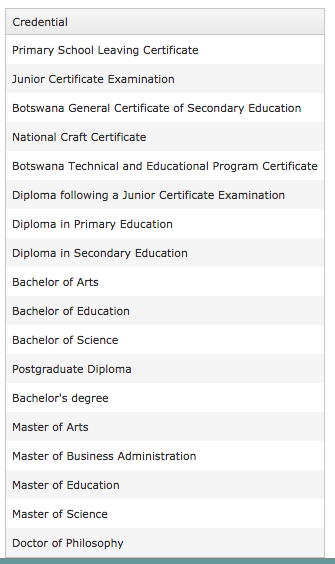
Universities in Botswana
This list includes universities, colleges, vocational schools, and other higher education institutions.
Higher Education is provided by 27 tertiary institutions within the country. There is currently only one public university. There is a second public university under construction – The Botswana International University of Science and Technology – that is scheduled to accept its initial students in 2011.
The University of Botswana is divided into six faculties: business, education, engineering and technology, humanities, science, and social sciences. Between these six faculties, the university offers over 75 areas of concentration, with majors ranging from African Studies to Industrial Design.
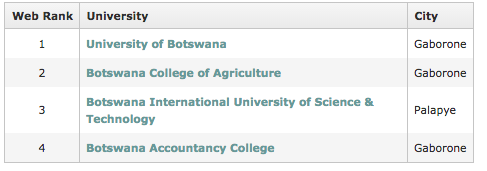
- Botswana News
-
- BOTSWANA: Routes Africa forum aims to improve African air connectivity
- BOTSWANA: Economic integration is helping boost trade and investment in Africa
- BOTSWANA: Africa’s economic growth is likely to be slower in the intervening years
- BOTSWANA: Beyond Commodities: How African Multinationals Are Transforming
- BOTSWANA: Africa,Protect Refugees With Mobile Banking
- BOTSWANA: African Union merges science and education bodies
- Trending Articles
-
- GHANA: Ghana steps up to secure electricity supply
- GABON: Gabon moves to solve housing deficit
- TUNISIA: Tunisia augments ICT exports and connectivity
- TANZANIA: Tanzania Breweries now partners with traditional liquor outlet owners
- SOUTH AFRICA: South Africa to extend ICT reach
- UKRAINE: Public debt for housing and utilities services in February up by 1% to Hr 13.5 billion



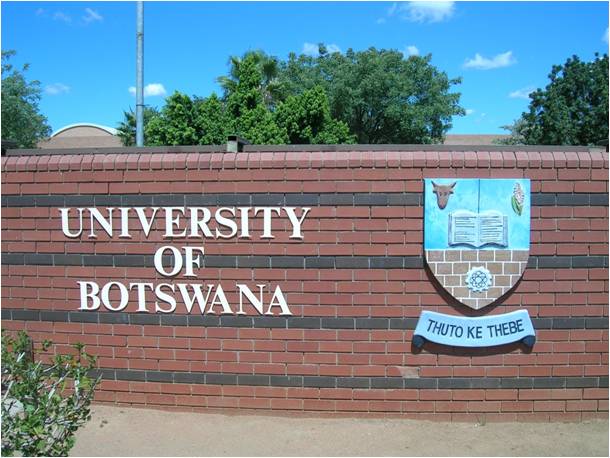

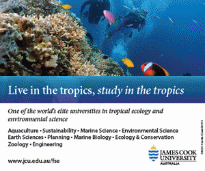
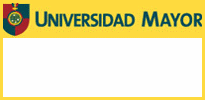
.gif?1356023993)

